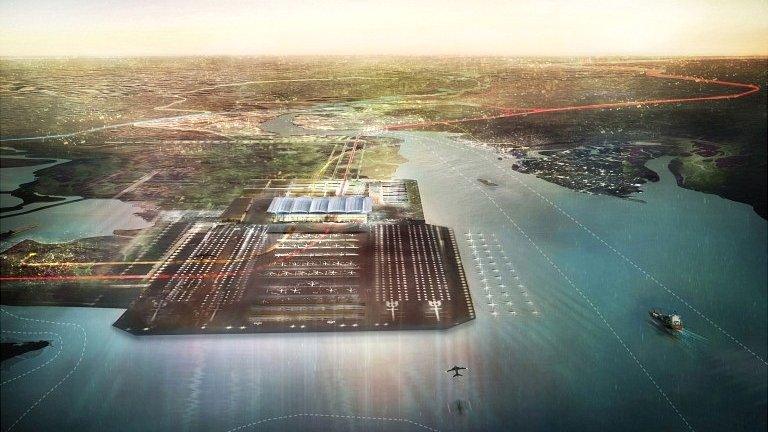Reaction to Boris Island Thames Estuary airport rejection
- Published
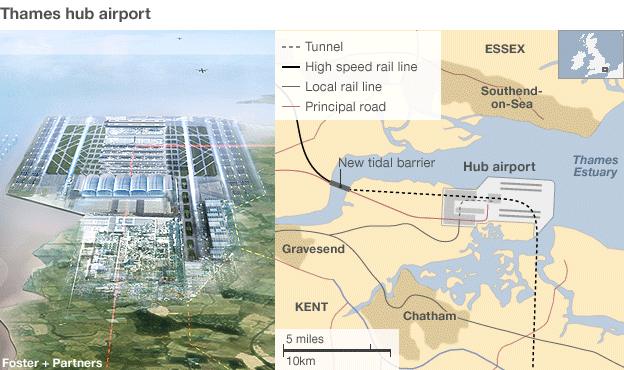
London mayor, Boris Johnson said an airport in the Thames estuary "will eventually be chosen"
Plans to build an airport in the Thames Estuary have been rejected by the Airports Commission.
The proposal - dubbed "Boris Island" after the London Mayor who trumpeted the scheme - would have led to the building of a four-runway airport on the Isle of Grain in Kent.
Commission chairman Sir Howard Davies said he had not been persuaded the airport was "the right answer" to meet London's and the UK's aviation needs.
London mayor Boris Johnson has backed the proposal for a new airport.
The Airports Commission was set up by the government to consider ways of expanding airport capacity.
The decision not to shortlist the Isle of Grain as an option leaves the commission with three choices: adding a third runway at Heathrow, lengthening an existing runway at Heathrow, and building a new runway at Gatwick.
The commission's final report is expected next summer, after the general election.
Those who battled for and against the airport plan reacted to its grounding:

'Bizarre proposal'
Rehman Chisthti, MP for Gillingham and Rainham
"The independent commission has listened to what we have been saying for many years; that it would be totally impractical, costly and would destroy important environmental sites.
"Local residents can now get on with their lives without the uncertainty that their local environment and quality of life would have been destroyed by this bizarre proposal."
"When it's in the best interest of the local area you work with everyone and do the right thing.
"The airport in the estuary was not the right thing do so we all worked together to oppose it."

'Common sense prevailed'
Rolf Williams, RSPB
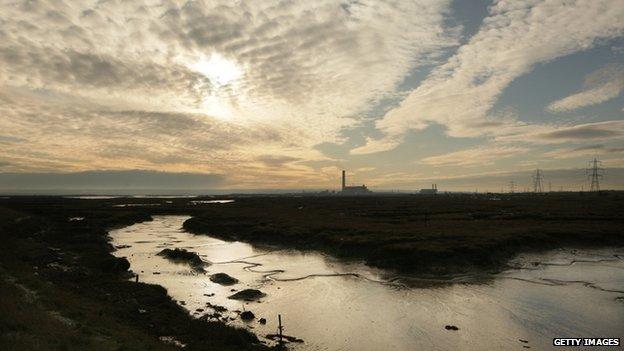
The Isle of Grain is located on the Hoo Peninsula and is almost all marshland
"It's really good news and we're really pleased that common sense has prevailed.
"The RSPB bases its fights on evidence, and the Davies commission based its decision on the evidence, and it's irrefutable now.
"They would have had to clear 13km radius around the airport of birds just for safety.
"In the end the only way would have been to kill the birds."

'Careering towards Heathrow'
Boris Johnson, Mayor of London
"The great merit of the estuary scheme is that it's environmentally sensitive, it solves the problem in the long term.
"What we're careering towards is a third runway at Heathrow... followed by a fourth runway."
He said he will continue to make the case for a new airport to the east of London.
"I'm absolutely certain that it is the option that will eventually be chosen."

'Grain isn't the answer'
Rodney Chamber, Leader of Medway Council
"We have said all along that it should never have even been considered.
"It would have resulted in the mass destruction of habitat and wildlife that could never be replaced.
"We've been here before with an airport at Cliffe.
"It's a pity Boris... didn't look at the reasons why the government 10 or 11 years ago was convinced you couldn't build a multi-runway international airport on the Hoo peninsular.
"Now they've decided that Grain isn't the answer either."

'Huge disappointment'
Neville Gaunt, Demand Regeneration in North Kent
"The Davies commission has come out with 'we're not prepared to take a risk. It's business as usual'.
"It's a huge disappointment. There has never really been a debate here, there has never been a campaign for the Yes vote.
"We have had a great opportunity to think differently and look at the long term future at the UK economy from an international point of view."

'Concerns over noise'
Sir Howard Davies, chairman of the Airports Commission
"We are not persuaded that a very large airport in the Thames Estuary is the right answer to London's and the UK's connectivity needs.
"Even the least ambitious version of the scheme would cost £70 to £90 billion in total."
The commission will now look at alternative plans for Gatwick and Heathrow airports.
"There are concerns over noise around Gatwick and we'd have to look at how the flight paths would operate.
"One of the big things people are worried about there is the impact on transport network, the roads which are fairly congested, and the railways line.
"We are looking at what you could do if you expanded at Gatwick to invest in the surface connections around the airport."

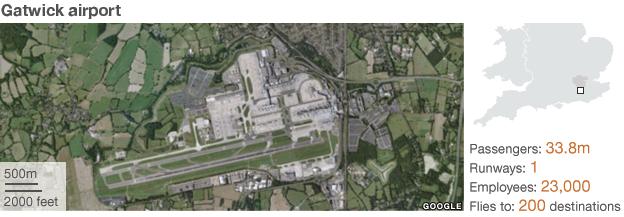
'Only option left'
Stewart Wingate, chief executive of Gatwick Airport
"We believe Gatwick has the strongest case.
"It is the only option left on the table that can be delivered with more certainty than either of the Heathrow options.
"It can be delivered without the significant environmental impacts expansion at Heathrow would inflict on London.
"It can be delivered faster than any other option, and at low cost and low risk."

'Profoundly depressing'
Crispin Blunt, Conservative MP for Reigate, chairman of the Gatwick Coordination Group
"The reasons given for the Airports Commission's decision are profoundly depressing.
"The commission is not seeking the right answer, but the path of least resistance.
"The need for a national hub airport and an examination of the long-term UK interest could be abandoned for short-term political considerations."

'No economic case'
British Airways
"We've always said that there was no economic case for a Thames Estuary airport.
"It's no surprise that the Davies Commission, after a thorough investigation, has ruled it out."
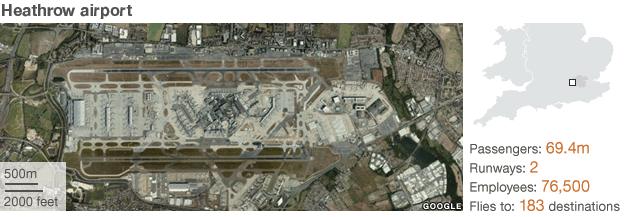

'Scathing condemnation'
Lord Foster, Thames Estuary airport architect
"I predict that Londoners will be scathing in their condemnation of today's announcement, when confronted with the inevitability of the blighting influence of Heathrow - the risks, noise and environmental impact of overflying London - and its inability to cope with predicted growth.
"Elsewhere in the world, relocating an airport that no longer serves its purpose is considered normal practice. France did it twice in a matter of decades.
"In Hong Kong we created a man-made island the size of Heathrow and built what was then the largest airport in the world - all in the space of six years."
- Published2 September 2014
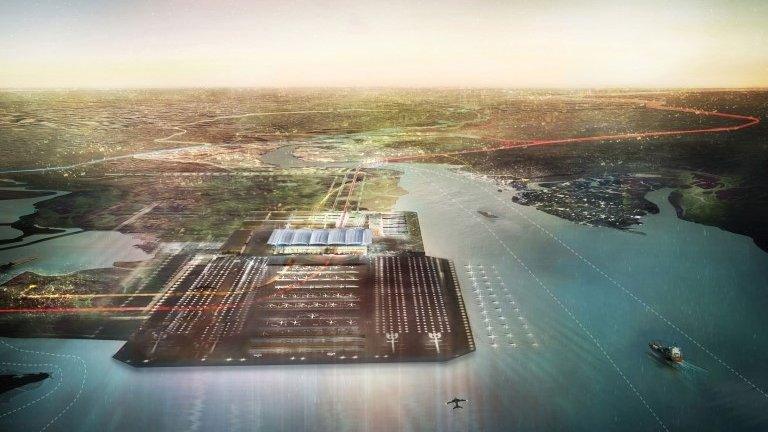
- Published1 July 2015
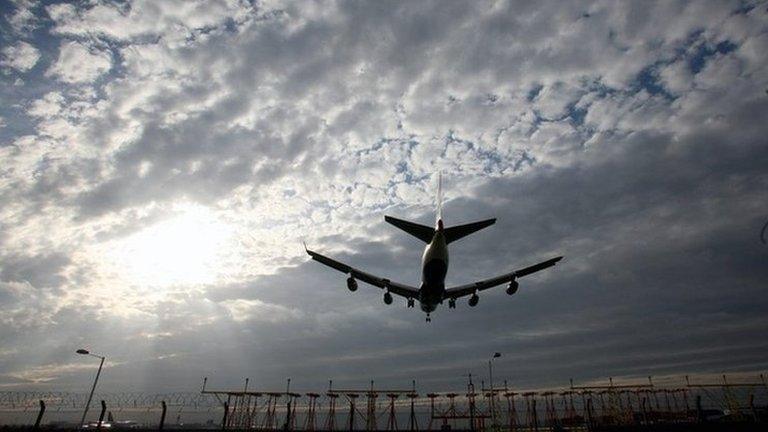
- Published1 September 2014
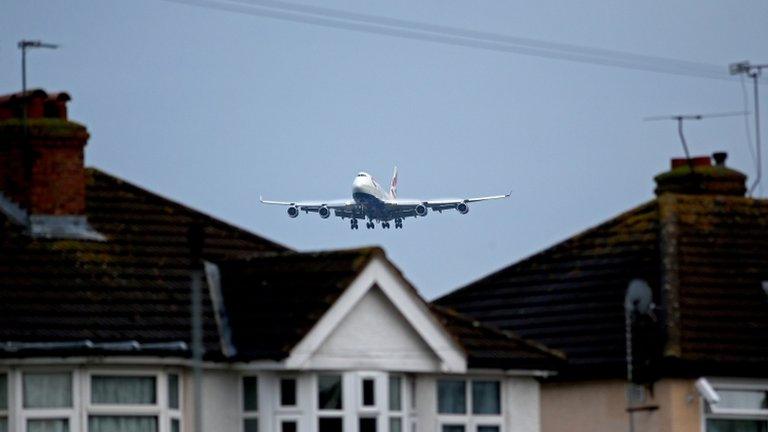
- Published26 August 2014
